This guide will help you understand all about sleep disorders among seniors and what you can do about them as a caregiver
Contents
A newborn infant sleeps for almost 16 to 20 hours a day; however, it becomes difficult for the senior to sleep at least 7 to 8 hours in the whole day. Around 5-8% of old-aged people suffer from Insomnia. As we age, our circadian rhythm is less effective than when we were young, so elders sleep less as their sleep cycle is shifted forward.
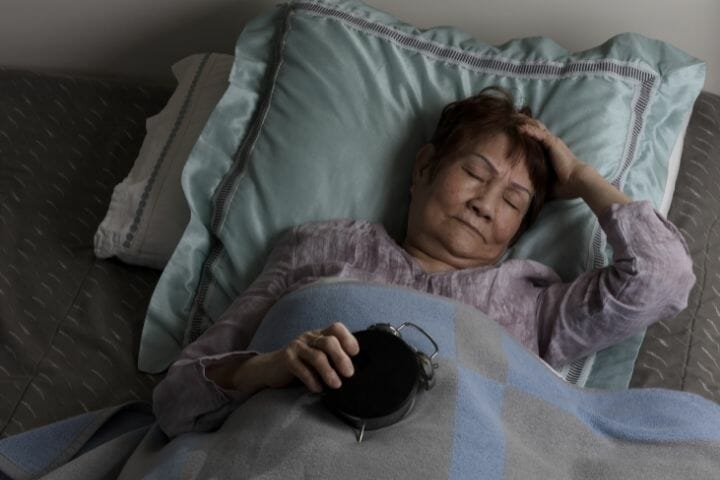
Elders are more likely to suffer from all kinds of sleep disorders, including loud snoring, Insomnia, or disturbed sleep cycles.
As a caregiver, you can do many things to help them sleep the whole night. But before learning about them, you must know about the various kinds of sleep disorders among elders. This will help you act promptly in a better way.
What Sleep Disorders Are Common Among Elders?
#1 Insomnia
Sleep patterns change throughout life, but worsen as we age. Insomnia is a common sleep disorder among older people.
A person who suffers from Insomnia suffers from disturbed sleep cycles like getting up at midnight at 3:00 a.m. after that, staying awake for two to three hours, and directly sleeping in the early morning.
The frequency of the nap time in the day increases. Excessive napping results in a change into sleep and wake upcycle.
You can get yourself checked by multiple sleep latency tests. This test measures the ability of a person to fall asleep in 20 minutes 4 to 5 times a day. You can measure sleepiness from the Epworth scale.
#2 Sleep apnea
Sleep apnea is a disorder where breathing starts and stops in a repeating pattern. If you remain tired even though you slept well, you may have sleep apnea. Sleep apnea is a disorder that occurs in 13 to 32% of people who have crossed the age of 65.
Sleep Apnea Types:
- Obstructive sleep apnea: This kind of sleep apnea is common amongst elders. This happens when the muscles in the throat relax.
- Central sleep apnea: This type of sleep apnea happens when your breathing is not being regulated properly by your central nervous system.
- Complex sleep apnea syndrome: As the name suggests, complex sleep apnea syndrome occurs when a person suffering from both of the above kinds. It is also called treatment-emergent central sleep apnea.
What are the symptoms of sleep apnea?
- Irritation
- Not being able to concentrate when the person is awake.
- Snoring loudly
- Insomnia
- Hypersomnia during the daytime
- Waking up with a dry mouth
- You stop breathing and then suddenly start breathing again. (Another person notices this)
Which factors heighten the risk of sleep apnea:
- Use of sedatives, tranquilizers, and alcohol: These three things are responsible for relaxing the muscles in the throat. This can worsen your condition.
- Family history: Having a family history of sleep apnea may increase your risk.
- Being male: Men have higher chances of suffering from sleep apnea than females. If a female is overweight or in the postmenopausal stage, then sleep apnea increases.
- Circumference of neck: People who have thicker necks may have narrower airways to breathe.
- Narrow airways: People with narrow airways can also suffer from sleep apnea. If adenoids or tonsils are present in their neck, it also results in blockage.
- Being obese: Being obese can enhance your risk of suffering from sleep apnea. Fat deposits can result in obstruction in breathing.

#3 Restless Leg Syndrome
A person who suffers from restless legs syndrome experiences discomfort in the legs, commonly after going to bed. This may lead to Insomnia if the person cannot shake their legs while in bed.
Other reasons responsible for RLS in seniors are mental and physical problems. We can classify it as mild or severe depending upon the symptoms. It causes disturbance in the person who suffers from restless legs syndrome. 1 out of 10 people are affected with RLS in their lifetime. The only way to get rid of discomfort is to shake the legs.
What are the symptoms of restless legs syndrome?
- Strong urge to move the legs
- Burning sensation, similar to electric shocks.
- Creeping sensation
- Aches
- Itching sensation
What are the symptoms of restless legs syndrome?
- Sleep deprivation due to discomfort
- Multiple changes in hormones
- Being deficient in iron, minerals, vitamins as well as folate levels.
- Increases sensitivity to touch and other senses
Tips to overcome RLS:
- Do not drink caffeine or sugar before sleeping.
- Reduce or eliminate your alcohol or tobacco consumption
- Sleep in a peaceful place.
- Try to reduce the amount of light before going to bed.
What factors can increase your risk of suffering from restless legs syndrome in elders?
- Spinal cord problems: Damage or injury in the spinal cord or lessons result in restless legs syndrome. If you suffer from a spinal block if you had taken anesthesia to the spinal cord, then there are chances that you suffer from RLS.
- Kidney failure: If you suffer from kidney failure and anemia, then there are higher chances of RLS. When kidneys cannot function adequately, then the iron stores in the body can reduce. Other changes that occur in the body may worsen the condition of RLS.
- Peripheral neuropathy: Excessive alcohol consumption and diabetes may damage the nerves present in the hands and feet.
- Iron deficiency: If you go through a heavy menstrual period or have suffered from an accident or injury. If you repeatedly donate blood or suffer from iron deficiency, you may suffer from restless legs syndrome.
#4 Periodic limb movement disorder (PLMD)
Periodic limb movement disorder in which a person makes repetitive Limb movement during sleep and wakes up. It includes lower extremities, i.e., flexion of the ankle, knee, and hip. There is an extension in the big toe. Some patients also suffer from Limb Movements in the upper extremities of the body.
What are the symptoms of periodic limb movement disorder ( PLMD)
- Fatigue during daytime
- Daytime sleepiness
- Non-restorative sleep
- Limb jerks
- Involuntary limb movements
What are the risk factors of periodic limb movement disorder ( PLMD):
Following are the risk factors that can enhance the occurrence of periodic Limb movement disorder:
- Diabetes mellitus
- Obstructive sleep apnea
- Restless legs syndrome
- Iron deficiency
- Narcolepsy– In this disorder, a person suffers from excessive sleep paralysis, sleepiness, and hallucinations.
- Sleep-related eating illness: In this disorder, a person eats during sleeping
- Multiple system atrophy- is a neurological disorder.
- REM behavior disorder.
- Uremia
- Spinal cord injury
- Spinal cord tumor
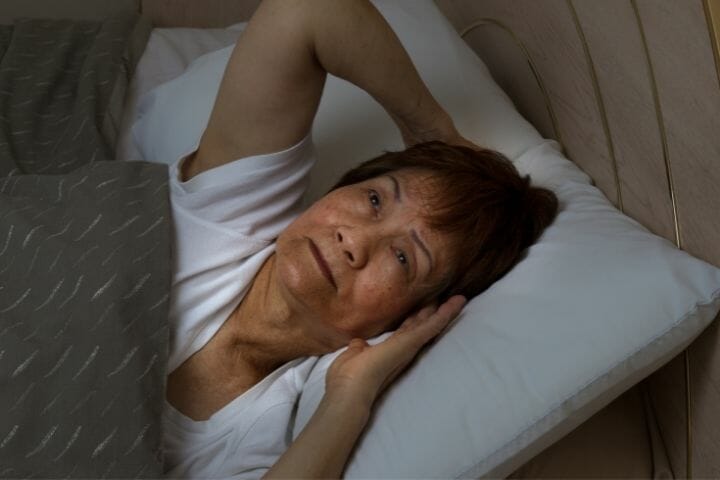
#5 Circadian Rhythm Sleep Disorders
Circadian rhythm sleep disorder consists of multiple sleep disorders, and all these disorders share one common feature: an obstruction in sleeping. Circadian rhythm refers to your body’s internal clock.
Circadian rhythm is known to control the sleep-wake cycle of our body. You can set your body’s internal clock with the help of light.
When light is transmitted in our eyes and goes into the control center of our brain, many factors influence our internal clock. A hormone named melatonin plays a vital role in sleep, social behavior, and the physical activities you perform. Even age can prove to be a factor in disrupting the sleep cycle.
What are the different types of circadian rhythm sleep disorders?
Advanced sleep phase disorder: A person who suffers from advanced sleep phase disorder is known to fall asleep in the evening between 6 a.m. to 9 a.m. and wake up early in the morning between 2 a.m. to 5 a.m.
- Many others, as well as middle-aged people, suffer from this.
- It may occur to you if you suffer from a family history.
- You wake up early in the morning.
- Insomnia
- You are usually sleepy in the latter half of the day.
Jet lag: Adults usually suffer from jetlag as their body’s internal clock is disturbed. People who work as a part of the aircrew are known to go through jet lag. As the time zones differ when you travel, adjusting and functioning in the new time zone takes time. Westward travel is easier than eastward travel as it is easier to delay sleeping.
- You feel general discomfort and uneasiness along with changes in the mood.
- You feel tired.
- Your appetite changes.
- Changes in the functioning of the bowel.
Shift work disorder: People who work in multiple shifts or are known to rotate shifts suffer from shift work disorder as you have to work at night, your work schedule changes. It fights with your body’s natural internal clock, and it becomes difficult to adjust to the change. It results in excessive sleeping or Insomnia due to changes in sleeping patterns.
- Mood disorders
- Gastrointestinal problems
- Indigestion
- Decreased sex drive
- Tiredness
- Uneasiness
Various other risk factors are also included, like excessive weight gain, high blood pressure, risk of alcohol, heart disease, and endometrial cancer. This type of health issue is more commonly noticed in people who have a night or early morning work shifts.
Irregular sleep-wake rhythm: People suffer from undefined or irregular sleep-wake rhythm. They tend to take multiple naps in the 24 hours. People suffer from Insomnia, excessive sleepiness, or both. This kind of disorder is seen in people who suffer from neurological disorders like dementia.
Non-24 hour sleep-wake syndrome: In this condition, people have an internal clock longer than 24 hours. In this case, the sleep-wake cycle changes every day and delays at least 1 to 2 hours every single day. Blind people are more likely to suffer from this kind of disorder, and Wake-up time changes every day in this condition.
What are the symptoms of circadian rhythm sleep disorders:
- Insomnia
- Sleep loss
- Depression
- Stress in the relationships and family
- Poor academic performance
- Excessive daytime sleepiness
- Difficulty in waking up early in the morning
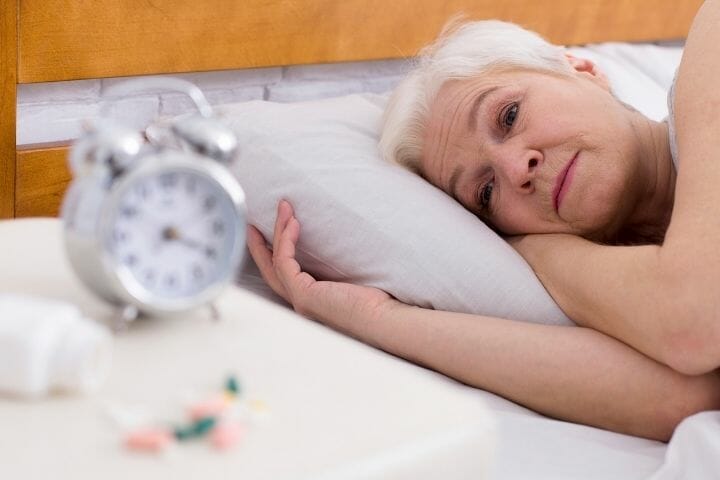
Caregiver’s Guide To Help Elders Who Suffer From Sleep Disorders
It becomes stressful for you when you see your elders wandering in the entire house. When they suffer from stressful conditions and are not able to sleep the whole day, it becomes essential to take care of them.
You need to pay attention to some points to overcome these sleep disorder patterns. Let’s have a glance at these points so that, being a caregiver, you can assist them.
Cut off the stimulants from their routine
If your elders drink excess coffee, try to limit their coffee intake. If they drink coffee once in a while, try to eliminate it. If they feel like drinking tea or coffee every hour, try to limit this.
You can provide them healthy drinks with buttermilk, smoothies, and juices like kale juice, carrot, and beetroot juice by replicating tea or coffee.
Make them understand the significance of healthy habits and try to balance what they like and what is healthy by providing them healthy dishes with a twist.
Schedule sleeping time
Try to maintain a regular sleep routine for elders. Fix their sleep schedule once they accomplish all the necessary tasks of their day. Try to switch off mobile phones and ask them to stay away from television screens at least an hour before they sleep.
They can even work on their hobbies. You can play some relaxing music for them, which will send a signal to the brain that it is time to sleep. You can ask them to sleep by switching off the light, and the body starts preparing for sleep.
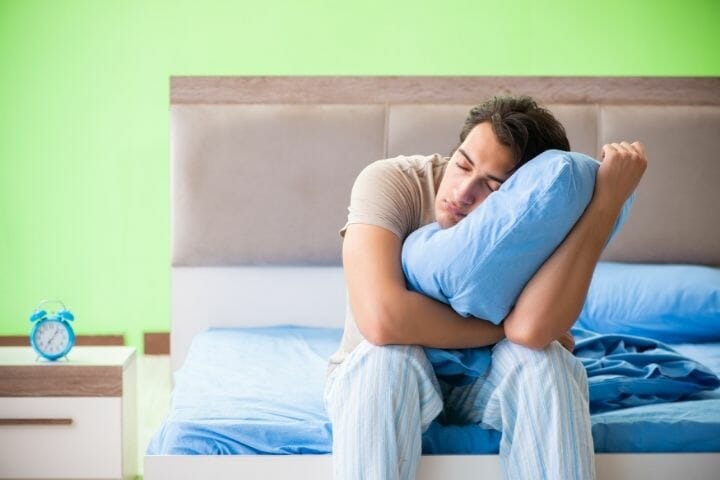
Restrict Bed Usage For Other Activities
You can ask them to allot their bed as a place for sleeping and let them avoid any other task like reading books or performing other activities like watching TV out of their bed. This will help our seniors maintain their schedule and sleep at the proper time.
Let them avoid daytime naps
As a caregiver, try to engage them in another activity to not sleep in the afternoon. Try to eliminate their daytime naps as much as possible.
People who sleep in the daytime make multiple changes in their sleep cycle. Try to keep them engaged and busy as much as possible, so they do not sleep and lie on the couch.
Avoid heavy snacking at night time
Ensure that they always eat their dinner at least 2 hours before sleeping. You can ask them to avoid consuming heavy snacking as much as possible at night time.
By consuming fatty food, our bodies won’t digest the food while they sleep. It may result in indigestion in the morning so ask them to avoid heavy snacking late at night as much as possible.
Don’t combine fruits with dinner
When we combine meals with fruits, the body starts digesting fruits instead of the meals in the body. As a result, the body takes more time and more energy to digest the food. Thus elderly may wake up tired early in the morning.
Try to use sleep medicines with vigilance
Pay special attention to the dosage when your elders consume sleep medicines. Try to take all the necessary precautions. Don’t overdose on any kind of sleep medicine. Make sure that they do not consume any type of sleep medicine without the doctor’s prescription.
Encourage daytime exercise
You can ask them to perform daytime exercises and fix your sleep timings gradually. You can ask them to perform exercises like
- Brisk walking
- Yoga
- Meditation
- Strength training
- Cardio activities
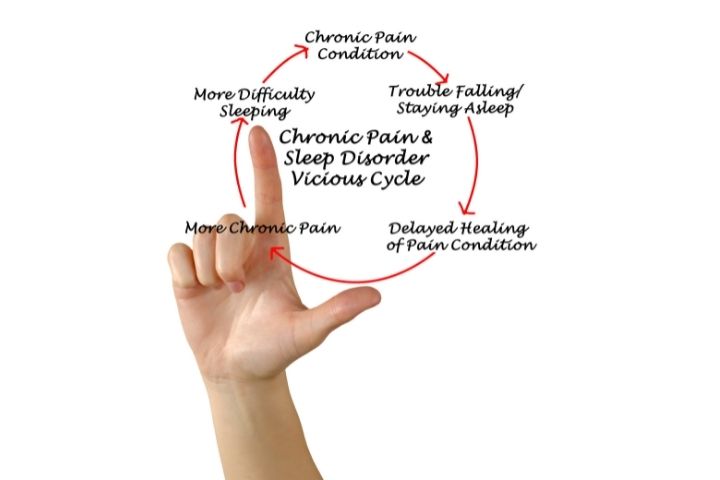
Tell them to get out of bed if they don’t fall asleep
If our elders don’t fall asleep within 30 minutes of the sleeping time, they can get out of bed and get engaged in their daily activities.
They can take a warm bath before bed
You can ask them to take a bath with warm water. It proves to be soothing as well as relaxes the entire body. This will stimulate your sleep. After a bath with warm water, they can get a sound sleep.
Provide them with a glass of warm milk with saffron
You can provide your seniors with a glass of warm milk and sprinkle some of the saffron on it. Warm milk is known to stimulate sleep and result in sound sleep. As a caregiver, you can even add a pinch of turmeric too. Make sure that they drink it at least an hour before they sleep.
Ask them to avoid tobacco and alcohol
Make sure they eliminate tobacco chewing and drinking alcohol from their routine. As a caregiver, you can minimize these activities for a good night’s sleep from your seniors’ daily routine.
Do their preparations for the next day
By making preparations for the next day, they can stay organized. They can sleep with the satisfaction that they have accomplished all the tasks during the day. This will reduce their stress levels so that they can sleep properly.
Make sure your seniors consume their blood pressure tablets on time
People who suffer from high blood pressure are not able to sleep properly. If your parents suffer from high BP levels, you can suggest they consume their medicines on time. This will maintain their blood pressure levels, and they can sleep properly.
Your seniors can have melatonin tablets
Since melatonin is a hormone responsible for sleep, if your elders suffer from Insomnia, you can provide them melatonin tablets at least 1.5 hours before sleeping time. Make sure your seniors do not consume any kind of tablet without the doctor’s prescription.
Keep their bedroom cool and dark
Dark and cozy places prepare the brain for sleeping by releasing the melatonin levels in the body. You can put the lights off and keep their bedroom cool and dark.

Replace Old Mattress
As a caregiver, you can replace their old mattress with a mattress that consists of memory foam, polyfoam, and small pocketed mini coils. It would be great if the mattress consisted of a Euro-top padding layer.
Manage the temperature
Set the temperature of the room in which the elders are comfortable sleeping. If they are habituated to sleeping at a cool temperature, set your AC properly.
Minimize the noise
Try to minimize the noise in the surrounding area. Turn off the TV as well as other loudspeakers. You can try to close the window and avoid other people interrupting in between.
Answers To Other Questions About Sleep Disorders
Can caregiving improve the quality of sleep?
All the vital functions of the body are interrelated. By paying attention to the small efforts in our daily routine and following the caregiver’s tips, we can improve our quality of sleep.
This will help them wake up energetic in the morning. This helps in fixing proper sleep timing and enhances the quality of our life.
Can a person who suffers from Insomnia take melatonin tablets?
Yes, a person who suffers from Insomnia can take melatonin tablets with the proper recommendation from the doctor.
However, consuming melatonin tablets every day is not suitable for our bodies. If we take these tablets every day, the condition will worsen as our body will get habituated to this tablet, and we won’t be able to sleep without having them.
Can a person overcome jet lag?
A person suffers from jet lag either when traveling to a new zone or when they rotate the work shift. Yes, gradually, the person can overcome jet lag as they cope with the timings and the sleeping patterns.
Can old people overcome these sleep disorders?
By fixing the underlying cause of the sleep disorder, a person can overcome it if you suffer from any kind of chronic disorder. You can take the necessary guidelines from the doctor and follow them.

Wrapping Up
It is not an easy task to be a caregiver for the elderly and especially when the elderly are suffering from sleep disorders. It affects your routine and their routine as well. However, there is a solution for every problem, and sometimes the solution is as simple as the ones mentioned above.
Above, we have mentioned all the tips that can help you serve the elderly and ensure better sleep for them. We hope you find these tips helpful. However, if the problem increases and you see there is no improvement in their condition, you must immediately consult their doctor.

